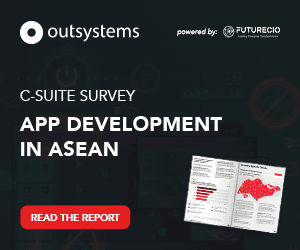Forrester predicts that 2024 will usher in an era of intentional AI where gimmicks and technical experimentations of Gen AI will give way to more focused and strategic initiatives. As generative AI becomes a new norm, its implementation may mean more risks and challenges as well as new opportunities for organisations and enterprises globally.
Fred Giron, senior research director at Forrester explains how Generative AI will transition from hype to intent. Click on the Podchat player to hear Giron go into details.
What makes AI different
Fred Giron: Forrester has always been on the back foot when it comes to emerging technologies of how organisations navigate these emerging technologies.
This is not the case for Generative AI. We see that as a truly transformative technology that has the potential to help organisations completely reinvent the operating model and engage the ways they engage with their customers with employees. Unlike other technologies, these AI systems can learn to evolve and improve sometimes autonomously.
From a traditional perspective, this ability to synthesise and analyse extensive datasets to identify patterns, predict outcomes, and being able to transform your data into a profound strategic asset at a scale. Generative AI converses in their language with big piles of data to create new content from that data.
It forces CIOs to think both short term and long term. The way you're going to create AI capabilities needs to have a longer-term view, as opposed to other emerging technologies.
"You need to be able to build some of the foundational capabilities in terms of data infrastructure, data management, and data governance, bringing the tools that you will need to train your model to evolve your models and then inject this intelligence into your business processes."
Fred Giron
Capitalising on the potential of GenAI for small and medium organisations in Asia
Fred Giron: About thirty per cent of the companies in Asia Pacific will start their journey by leveraging the transformative power of AI to benefit from the transformative capabilities of Gen AI, you need to have your data house in order and unfortunately a very small number of organisations in Asia Pacific have that capability in investing in the right data governance processes, data management, data infrastructure tools, and solutions as well as the culture.
They need to have the ability to tap into the ecosystem and get started, trying to understand the potential of these technologies, understand the risks that are related to these technologies. Hopefully, it helps them understand that there's a lot of work to be done to get their data house in order before they can tap into the transformative power of these technologies.
Start local enterprises' AI journey

Fred Giron: The first thing is to get everybody on the same page, everybody speaking the same language when it comes to AI. The second thing after education is about crafting a modern Build-Your-Own-AI management policy. The third thing is to experiment with the AI. It's a really good way to create this shared understanding to bring everybody a diverse pool of executives to work on a very new topic and get to something that is not perfect of course, but something that is pretty good for the amount of time that you spend on.
Riding the lack of regulatory framework
Fred Giron: I think it's a double-edged sword. On one end, it gives you the freedom to innovate because you don't have any constraints but I think it's also a problem in the sense of the lack of structure. It can be daunting without clear rules.
Hopefully, regulators are going to be catching up pretty soon because otherwise, the uncertainty of regulations will probably slow down artificial intelligence adoption in the Asia Pacific region.
On AI adoption and technical debt
Fred Giron: If you just look at the cost of your capabilities and AI infrastructure without considering the value that you're getting from this, you will freak out. You need to put that cost in front of the value that you're generating. That might be operational improvements, productivity improvements, and what you do with this productivity. Are you creating innovations that are going to create new revenue streams for your organisation? That's a very different equation and that's a very different discussion in terms of the short-term view versus the long-term view and absolutely.
Artificial intelligence and the decisions that you're making today will impact your organisation and your cost structure for many, many years to come.
Our latest research in Asia Pacific shows that only 42% of companies have an enterprise architecture practice today, 30% used to have an enterprise architecture practice, but they had to disband it because they couldn't prove the value.
"You need to operate your capabilities with sound financial management capabilities, but it's really about mapping the cost to the value that you are delivering. That's where enterprise architecture is crucial to balance this equation between innovation and legacy technology management."
Fred Giron
2024 predictions for AI
Fred Giron: Around 50% of organisations that are trying to scale generative AI capabilities in 2024 will fail and will work closely with the service providers. Software assistants enable software systems that work alongside the developers to help them code, test the code, analyse the performance of the code, and so on.
It takes a lot of work. That's where service providers will be able to help a lot of these companies understand how they can get their data house in order and then transform their processes to get access to this transformative power that we're talking about.
Click on the podchat player as Giron talks about how AI transforms from hype to intention
- What makes AI different from other technologies that were predicted to transform organisations?
- How do you see Asian organisations outside large and multinational companies capitalising on the potential of AI including GenAI?
- What needs to be done for local enterprises to start on their AI journey?
- Will a lack of regulatory framework present challenges for local players in regulated sectors, and how do they go about, riding this lack of regulatory framework?
- Do you see the adoption of AI as further driving organisations into technical debt that they could not afford?
- Given that 2024 is just around the corner and you brought up some predictions already, what would be your predictions for AI in the coming years?




